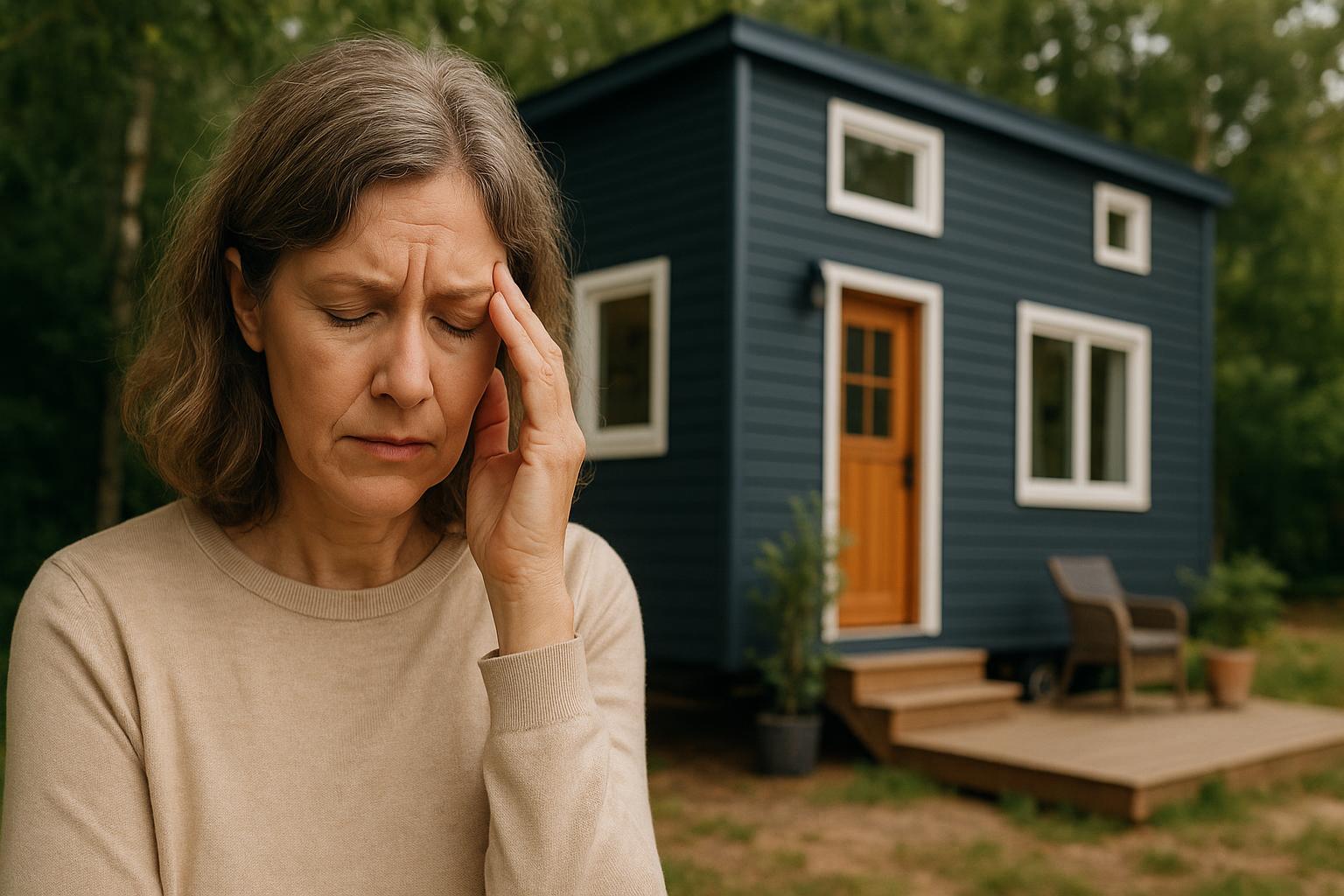
Downsizing: Navigating Emotional Challenges and Embracing a Rewarding Lifestyle through Tiny Home Living
Estimated reading time: 7 minutes
Key Takeaways
- Downsizing is not just about reducing space—it’s a transformative journey that reshapes lifestyle and mental well-being.
- Emotional challenges from leaving a long-time home are real; however, clear strategies and compassionate planning ease the transition.
- Tiny home living and ADUs offer affordability, simplification, and improved mental health.
Table of contents
Understanding the Emotional Challenges of Downsizing and Mental Health
Downsizing often triggers deep emotions—feelings of loss, anxiety, and strong sentimental attachment. A home holds decades of memories, routines, and personal identity. Leaving it behind can feel overwhelming.
Why the Emotional Impact of Downsizing Is So Strong
- Homes as Identity and Security: The home is not just a structure; it represents love, milestones, and comforting routines.
- Attachment to Memories and Belongings: Items accumulated over years carry irreplaceable stories, making it hard to part with them.
- Fear of the Unknown: Anxiety emerges when envisioning life in a new, smaller space with different neighbours and routines. Discover support on the emotional benefits of ADUs.
Mental Health Impacts During a Lifestyle Change
- Stress and Anxiety: The anticipation and planning can lead to sleepless nights.
- Grief and Loss: Leaving behind a space filled with memories can feel like mourning a part of oneself.
- Uncertainty about New Beginnings: Adapting to a new lifestyle sometimes invites self-doubt.
Strategies to Cope with the Emotional Side of Downsizing
- Open Conversations: Share hopes, fears, and expectations with family or friends.
- Gradual Adjustments: Start preparing emotionally and practically well in advance. For detailed downsizing and decluttering tips, take it step by step.
- Focus on Benefits: Remind yourself of the freedom, reduced cost, and simplified living awaiting you.
- Seek Support: If the load becomes too heavy, professional help or trusted loved ones can make a big difference.
Sources: Canadian Mortgage Trends | Kelowna Real Estate
The Role of Decluttering in the Downsizing Process
Decluttering is a critical part of downsizing. It means sorting through belongings and deciding what to keep, donate, or discard. This process not only clears physical space but also eases mental strain.
Why Decluttering Matters
- Creates Space for the Future: Clearing out brings in new opportunities and a fresh start.
- Reduces Emotional Impact: Tackling clutter can make the idea of downsizing less intimidating.
- Promotes Reflection: Deciding what stays helps connect with your core values.
Practical Decluttering Tips for Downsizing
- Set Manageable Goals
- Focus on one room or closet at a time.
- Establish daily or weekly targets to avoid overwhelm.
- Start Small
- Begin with items with less sentimental value like paperwork or gadgets.
- Track Progress
- Use a checklist or journal to record completed areas and celebrate milestones.
- Ask for Help
- Invite family or friends for support, or consider professional organizers for complex tasks.
- Sort by Category
- Separate items into keep, donate, sell, or recycle piles.
For a thorough guide to minimalist living and decluttering techniques supporting mental clarity, see this resource.
Source: Kelowna Real Estate
The Benefits of Tiny Home Living and ADUs for Mental Health and Lifestyle Change
Tiny home living and ADUs offer more than just savings—they represent a shift towards simpler, more mindful living. Compact and thoughtfully designed, they align with a minimalist mindset that enhances mental clarity.
Why Tiny Home Living Is Gaining Ground in Canada
- Affordability: Lower purchase prices, taxes, and utility bills leave you extra funds. Discover key benefits here.
- Lower Maintenance: Smaller spaces mean less upkeep and fewer repairs.
- Simplified Living: Fewer belongings and distractions allow a focus on what truly matters.
Mental Health and Lifestyle Benefits
- Less Anxiety: Fewer decisions and reduced clutter lead to a calmer mindset.
- Mindfulness: Compact spaces promote intentional living and greater awareness of your surroundings.
- Connection and Purpose: Encourages engagement with your community and environment. Learn more about tiny home community living in this guide.
- Flexibility: Tiny homes and ADUs accommodate multi-generational living or flexible rental options. For insights on multi-generational living, visit this page.
Financial Advantages
- Lower Monthly Costs: Reduced utility, insurance, and mortgage payments.
- Unlocking Equity: Selling a larger home can free up funds for other priorities.
- Reduced Consumption: Embracing small living discourages needless purchases.
Sources: Kelowna Real Estate | Canadian Mortgage Trends
Strategies to Make Downsizing, Decluttering, and Tiny Home Living Smoother and More Rewarding
Downsizing is a major life change, but the transition can be made easier with effective strategies and support.
1. Plan Your Downsizing Journey
- Set Clear Goals
- Decide on your priorities—whether it’s less maintenance, more free time, or financial freedom.
- Establish a clear timeline with actionable steps.
- Create a Moving Checklist
- Break down the process: declutter, donate or sell items, pack, and update service providers. Detailed checklists can be found here.
- Consult Professionals
- Seek guidance from downsizing experts, real estate agents, or legal advisors. Consider attending tiny home community workshops for additional insights.
- Research Housing Options
- Explore different options like tiny homes, ADUs, or condos, and be aware of any zoning rules. For ADU permitting guidance, see this guide.
2. Address the Emotional Side
- Build a Support System: Involve family, friends, or support groups to talk through emotions and challenges.
- Practice Mindfulness: Keep a journal, meditate, or try breathing exercises to stay centered.
3. Leverage Community Resources for Tiny Home Living and ADUs
- Find Local Associations: Join local tiny home or ADU groups to benefit from their advice and shared experiences.
- Connect & Learn: Participate in community tours, open houses, or city planning sessions to stay informed.
4. Embrace Community and Shared Experience
- Join Workshops & Events: These gatherings offer hands-on advice and foster a sense of community.
- Swap and Donate Events: Engage in local events to donate items and connect with neighbors.
Source: PwC Real Estate Trends
Conclusion: Embracing Downsizing and Tiny Home Living for a Healthier, Happier Lifestyle
Downsizing is more than moving into a smaller space—it’s a deliberate lifestyle change filled with both emotional challenges and rewarding opportunities. Though leaving behind a long-time home can trigger anxiety and grief, careful planning and open conversations pave the way for a lightened life.
In time, most find that the benefits—lower costs, reduced responsibilities, and a simplified environment—far outweigh the initial struggles. Decluttering, whether physical or emotional, sets the stage for a life that is more intentional and enriched. Learn more about the benefits of a minimalist lifestyle.
There is no single “right” way to downsize. With clear planning, a vision for the future, and supportive community connections, the journey becomes one of empowerment and renewed possibility.
Embrace the process with patience and self-compassion, and look forward to a future that’s lighter, happier, and more fulfilling.
Sources: Kelowna Real Estate | Canadian Mortgage Trends
Frequently Asked Questions
Q1: What does downsizing really mean?
A1: Downsizing is the process of moving from a larger home to a smaller, more manageable space, aimed at reducing costs, maintenance, and embracing a simpler lifestyle.
Q2: How can I cope with the emotional stress of leaving my longtime home?
A2: Open conversations, gradual adjustments, and seeking support from family, friends, or professionals can greatly ease the emotional burden. Mindfulness and journaling are also effective tools.
Q3: Are tiny homes and ADUs really more affordable?
A3: Yes, tiny homes and ADUs typically offer lower purchase and maintenance costs, reduced utility bills, and a streamlined lifestyle that emphasizes important aspects of living over material possessions.
Q4: Where can I find more information about downsizing tips and tiny home living?
A4: A wealth of resources is available online. For practical tips on downsizing and decluttering, visit this guide and for tiny home living benefits, check out this resource.

Leave a Reply